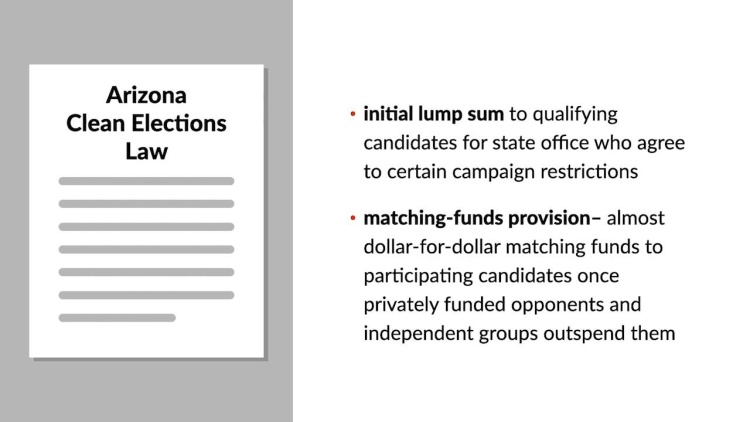Arizona Free Enterprise Club’s Freedom Club PAC v. Bennett
United States Supreme Court
564 U.S. 721 (2011)
- Written by Angela Patrick, JD
Facts
Arizona’s Clean Elections Act (the act), passed by a ballot initiative in 1998, granted an initial lump sum of money to qualifying candidates for state office who agreed to accept certain campaign restrictions. These restrictions were intended to reduce political corruption. The act also contained a matching-funds provision, which granted an almost dollar-for-dollar amount of matching funds to participating candidates once their privately funded opponents and independent expenditure groups, who were not participating in the clean-elections program, outspent them. Arizona Free Enterprise Club’s Freedom Club PAC, several candidates running for state office, and others (collectively, Free Enterprise) (plaintiffs) sued Arizona Secretary of State Ken Bennett and others (collectively, Bennett) (defendants), arguing that the act’s matching-funds provision infringed on privately funded candidates’ and the independent expenditure groups’ First Amendment right to free speech. The district court enjoined the state from enforcing the matching-funds provision, finding it imposed a substantial burden on free speech without a compelling state interest. The Ninth Circuit reversed, finding that the provision imposed a minimal burden on free speech and furthered the compelling state interest of combatting political corruption. The United States Supreme Court granted certiorari.
Rule of Law
Issue
Holding and Reasoning (Roberts, C.J.)
Dissent (Kagan, J.)
What to do next…
Here's why 904,000 law students have relied on our case briefs:
- Written by law professors and practitioners, not other law students. 47,100 briefs, keyed to 995 casebooks. Top-notch customer support.
- The right amount of information, includes the facts, issues, rule of law, holding and reasoning, and any concurrences and dissents.
- Access in your classes, works on your mobile and tablet. Massive library of related video lessons and high quality multiple-choice questions.
- Easy to use, uniform format for every case brief. Written in plain English, not in legalese. Our briefs summarize and simplify; they don’t just repeat the court’s language.





